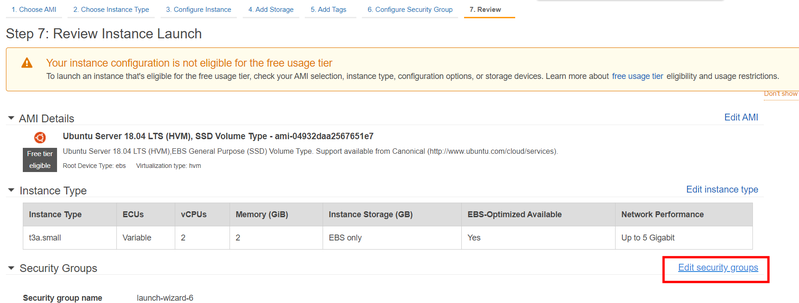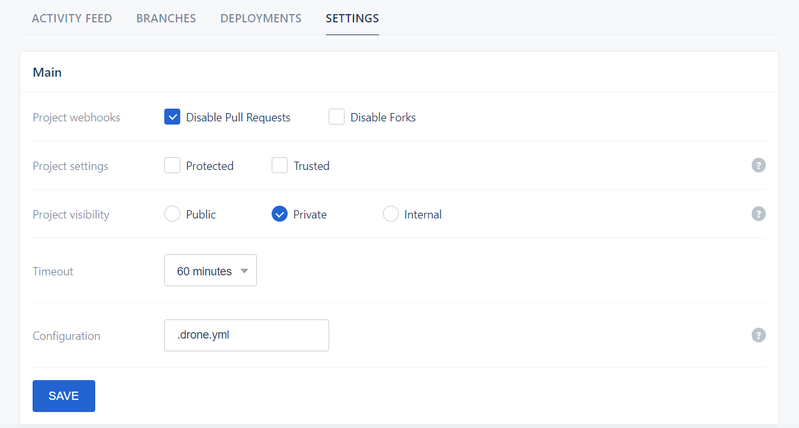Deploy docker-compose using Drone CI
Here I will show the simplest and fastest way to automate the deployments for the web apps with any complexity level. We will use a secure SSH connection between the Drone CI host and the Application host. In short, the way is next:
- We will create a docker-compose description that delivers resources and apps on any machine.
- Order VPS (or dedicated) host with public IP, ssh access, and open application ports.
- Tweak SSH settings on the VPS to allow multisession connections for docker deploys.
- Create bash script which creates ssh private/public key pair inside of deployer-container, then exports
DOCKER_HOST=ssh://root@<host IP>and runsdocker-compose up.
All instructions are explained below.
We used Ubuntu 18.04 OS for my Amazon EC2 t3a.small instance (you can use any hosting). Less than 2 GB might cause memory and subsequent hanging up issues.
You need to have the next TCP ports open:
22for SSH- all ports that your application are listening on (e.g.
80,443)
If you use Amazon EC2, all ports are closed by default, but you can open ports in Security Group configuration. To do it on instance launch dialog:

Many VPS/Dedicated hosting providers have all ports open by default.
Login by keypair
Login as ubuntu user with .pem file downloaded from AWS Console:
ssh -i ~/xx.pem ubuntu@xxxxx
Edit file:
sudo nano /etc/ssh/sshd_config
Add lines to the end (These settings are required to properly work with docker builds):
| PermitRootLogin yes | |
| MaxSessions 500 | |
| MaxStartups 500 |
Run:
sudo service sshd restart
To apply changes✅.
Add your local public ssh key 🔑 content (cat ~/.ssh/id_rsa.pub, use ssh-keygen on your localhost, if you have no such file) to the next file on the remote host (add to beginning with one line break after):
sudo nano /root/.ssh/authorized_keys
By doing this you allow direct connection using your ssh key with a command from your OS user, like this:
ssh root@<APP_HOST_IP>
Prepare docker host
Now, on remote host, uninstall all old dockers:
sudo apt remove docker docker-engine docker.io
Installing docker
sudo apt update && sudo apt install docker.io
Prepare repository:
As an example, we will show the config for the Django project.
/.drone.yml
| kind: pipeline | |
| name: default | |
| type: docker | |
| concurrency: | |
| limit: 1 | |
| steps: | |
| - name: slack-begin | |
| image: plugins/slack | |
| settings: | |
| webhook: | |
| from_secret: slack_webhook | |
| username: Drone | |
| icon_url: ${DRONE_COMMIT_AUTHOR_AVATAR} | |
| template: > | |
| {{repo.name}}/{{build.branch}} - Started #{{build.number}} "${DRONE_COMMIT_MESSAGE}" by ${DRONE_COMMIT_AUTHOR} (${DRONE_COMMIT_AUTHOR_EMAIL}) (<{{build.link}}|Open>) | |
| - name: build | |
| environment: | |
| VAULT_MASTER_SSH_PRIV_KEY: | |
| from_secret: VAULT_MASTER_SSH_PRIV_KEY | |
| VAULT_MASTER_SSH_PUB_KEY: | |
| from_secret: VAULT_MASTER_SSH_PUB_KEY | |
| VAULT_MASTER_PORTAINER_PASSHASH: | |
| from_secret: VAULT_MASTER_PORTAINER_PASSHASH | |
| VAULT_MASTER_DB_PASS: | |
| from_secret: VAULT_MASTER_DB_PASS | |
| VAULT_MASTER_SECRET_KEY: | |
| from_secret: VAULT_MASTER_SECRET_KEY | |
| image: devforth/drone-builder | |
| commands: | |
| - cd deploy && /bin/bash build.sh | |
| - name: slack-end | |
| image: plugins/slack | |
| settings: | |
| webhook: | |
| from_secret: slack_webhook | |
| username: Drone | |
| icon_url: ${DRONE_COMMIT_AUTHOR_AVATAR} | |
| template: > | |
| {{repo.name}}/{{build.branch}} - #{{build.number}} {{uppercasefirst build.status}} after {{since build.started}} (<{{build.link}}|Open>) |
This drone file uses 5 Drone Secrets. VAULT_MASTER_SSH_PRIV_KEY and VAULT_MASTER_SSH_PUB_KEY should be copied from your PC files (use cat ~/.ssh/id_rsa for first and cat ~/.ssh/id_rsa.pub) to Drone Vault.
VAULT_MASTER_PORTAINER_PASSHASH - password hash for Portainer (docker admin panel), you can remove it from config if you don't need Portainer.
👆TO GENERATE for VAULT_MASTER_PORTAINER_PASSHASH use next command (works on any Linux/Mac or Docker on WSL2 on windows):
docker run --rm httpd:2.4-alpine htpasswd -nbB admin 'yourPortainerPpass' | cut -d ":" -f 2
Other secrets are defined to improve application security (better to store all sensitive values in drone vault)
/deploy/build.sh
| #!/bin/bash | |
| branch=$(git branch | grep \* | cut -d ' ' -f2) | |
| branch=`echo $branch | sed 's/feature\///g'` | |
| echo "Building branch $branch" | |
| if [ -z "$VAULT_MASTER_SSH_PRIV_KEY" ]; then | |
| echo "Running not on Drone (localy)" | |
| else | |
| mkdir -p ~/.ssh/ | |
| echo "$VAULT_MASTER_SSH_PRIV_KEY" > ~/.ssh/id_rsa | |
| echo "$VAULT_MASTER_SSH_PUB_KEY" > ~/.ssh/id_rsa.pub | |
| chmod 600 ~/.ssh/id_rsa | |
| chmod 644 ~/.ssh/id_rsa.pub | |
| eval `ssh-agent -s` | |
| ssh-add ~/.ssh/id_rsa | |
| echo -e "Host *\n\tStrictHostKeyChecking no\n\n" > ~/.ssh/config | |
| fi | |
| if [ "$branch" = "master" ]; then | |
| HOST_DOMAIN=<APP_HOST_IP> | |
| # add more environemnts for branches here, e.g.: | |
| # elif [ "$branch" = "develop" ]; then | |
| else | |
| echo "No configuration for branch $branch" | |
| exit -1 | |
| fi | |
| export DOCKER_HOST=ssh://root@$HOST_DOMAIN | |
| # cleanup cache from previous builds | |
| docker builder prune -a -f | |
| docker container prune -f | |
| docker rmi $(docker images -f "dangling=true" -q) || true | |
| # build and run db image (migration will connect to db) | |
| docker-compose -p stack-$branch -f docker-compose.yml -f assets/variables_$branch.yml up -d --build db | |
| # build django app contanier | |
| docker-compose -p stack-migrate-$branch -f docker-compose.yml -f assets/variables_$branch.yml build --compress django | |
| docker-compose -p stack-migrate-$branch -f docker-compose.yml -f assets/variables_$branch.yml run --no-deps --workdir="/code/" django bash -c 'pipenv run python manage.py collectstatic --noinput' | |
| docker-compose -p stack-migrate-$branch -f docker-compose.yml -f assets/variables_$branch.yml run --no-deps --workdir="/code/" django pipenv run python manage.py migrate | |
| docker-compose -p stack-$branch -f docker-compose.yml -f assets/variables_$branch.yml up -d --build --remove-orphans | |
| docker-compose -p stack-$branch restart nginx |
stack-migrate-$branch is used to reduce downtime during redeploys (migrating and collecting static actually performed before old container stopping).
/deploy/docker-compose.yml
| version: '3.5' | |
| services: | |
| db: | |
| network_mode: host | |
| image: mysql:5.7 | |
| restart: always | |
| command: --default-authentication-plugin=mysql_native_password --character-set-server=utf8mb4 --collation-server=utf8mb4_bin | |
| volumes: | |
| - v-db-data:/var/lib/mysql | |
| django: | |
| network_mode: host | |
| build: ../src/ | |
| command: /bin/bash -c "cd /code/ && pipenv run gunicorn --worker-tmp-dir /dev/shm conf.wsgi:application --bind 0.0.0.0:8001 --workers 5 --worker-connections=1000" | |
| # working_dir: /root/ | |
| restart: always | |
| volumes: | |
| - v-django:/code/serve_static | |
| nginx: | |
| network_mode: host | |
| build: nginx | |
| restart: always | |
| volumes: | |
| - type: volume | |
| source: v-django | |
| target: /static/django | |
| read_only: true | |
| volume: | |
| nocopy: true | |
| command: /bin/bash -c "envsubst '$$CERT_NAME $$DOMAIN $$BASIC_AUTH_ENABLE' < /etc/nginx/conf.d/conf.template > /etc/nginx/conf.d/default.conf && nginx -g 'daemon off;'" | |
| portainer: | |
| image: portainer/portainer:1.24.1-alpine | |
| network_mode: host | |
| volumes: | |
| - /var/run/docker.sock:/var/run/docker.sock | |
| - v-portainer-data:/data | |
| volumes: | |
| v-portainer-data: | |
| name: v-portainer-data | |
| v-db-data: | |
| name: v-db-data | |
| v-django: | |
| name: v-django |
network_mode: host is recommended for better networking performance (no docker virtual DNS names resolution is available in this mode, but network performs x1.5 - x2 times better)
/deploy/assets/variables_master.yml
This file is used to configure variables per one environment.
| version: '3.5' | |
| services: | |
| db: | |
| environment: | |
| - MYSQL_ROOT_PASSWORD=${VAULT_MASTER_DB_PASS} | |
| - MYSQL_DATABASE=db_live | |
| nginx: | |
| environment: | |
| # - BASIC_AUTH_ENABLE=1 | |
| - DOMAIN=yur_site.com | |
| - CERT_NAME=yur_site_cert | |
| django: | |
| environment: | |
| - ENV_NAME=live | |
| - DEBUG=False | |
| - SECRET_KEY=${VAULT_MASTER_SECRET_KEY} | |
| - DOMAIN=hinty.io | |
| - DATABASE_URL=mysql://root:${VAULT_MASTER_DB_PASS}@127.0.0.1:3306/db_live?charset=utf8mb4 | |
| portainer: | |
| command: --admin-password=${VAULT_MASTER_PORTAINER_PASSHASH} | |
Drone config might look like this:


![`img for Has been blocked by cors policy [Explain like I am 5] article`](https://s.hinty.io/TBqpEQhg5waaMmqtSCZKqf.png)